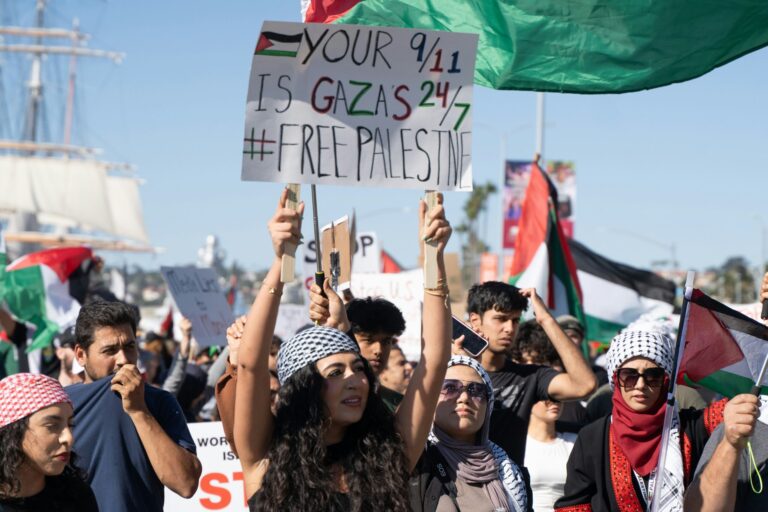On January 13, 2024, Washington, D.C. witnessed an unprecedented demonstration that reverberated across the nation, drawing thousands of protesters who demanded an immediate ceasefire in Gaza and a significant shift in U.S. foreign policy. The rally marked the 100th day of the Israel-Gaza conflict and highlighted a surge in public dissent against U.S. military involvement in the region. This mass gathering underscored the growing discontent with the current policies and reflected a united call for peace, justice, and an end to U.S. complicity in the ongoing violence.
A Unified Call for Change
The protest was organized by a coalition of human rights organizations, student groups, and community activists, culminating in a march from the National Mall to the U.S. Capitol. Carrying signs and chanting slogans, the demonstrators voiced their demands for an immediate ceasefire and an end to the U.S. government’s military support for Israeli operations in Gaza. Among the most frequently shouted chants were “Ceasefire now!” and “End U.S. complicity!” The emotional fervor of the protest was palpable, but it remained peaceful throughout, showcasing the protesters’ commitment to non-violent advocacy for peace.
Beyond demanding an immediate cessation of hostilities, the rally also called for a broader reevaluation of U.S. foreign policy in the Middle East. Many protesters expressed their growing concern about the U.S.’s continued military backing of Israel’s military actions and urged the government to adopt a more neutral and diplomatic approach to resolving the Israeli-Palestinian conflict. The event underscored the increasing dissonance between the public’s desire for peace and the foreign policy of the current administration, which many see as overly aligned with Israel’s actions in Gaza.
Personal Stories and Voices of Protesters
Among the sea of demonstrators, Sarah Ali, a student activist who had traveled from Michigan, shared her thoughts on the protest’s significance. “We are here to stand in solidarity with the people of Gaza,” Ali said. “This is about demanding our government take action and stop supporting the violence.” Her sentiments resonated deeply with a diverse group of participants, which included students, parents, veterans, and religious leaders, all united by a sense of urgency and a deep commitment to justice for Palestinians.
Political analyst James Zogby observed the importance of the protest in shifting public sentiment in the U.S. “This march is not just a protest; it signifies a broader change in American political attitudes,” Zogby explained. “There is a growing demand for an end to military support for Israel and a push toward peaceful, diplomatic solutions.”
Global Solidarity and Humanitarian Appeals
The Washington demonstration was part of a global wave of protests driven by the dire humanitarian crisis unfolding in Gaza. Images of destroyed hospitals, schools, and homes have ignited public outrage worldwide, fueling an outpouring of solidarity with Gaza. The protesters in Washington, D.C., called not only for an immediate ceasefire but also for a substantial increase in humanitarian aid to the region. They demanded that the U.S. government facilitate the delivery of essential supplies, such as food, water, and medical assistance, through safe corridors. Advocates argued that lasting peace in the region could only be achieved through justice, accountability, and the protection of human rights.
A Milestone in Public Engagement
The demonstration on January 13, 2024, marked a significant moment in American activism and political engagement, particularly concerning foreign policy. With its large turnout, the rally sent a clear message to lawmakers: Americans are paying attention to the conflict, and they are demanding that their elected officials take a stand for peace and human rights. While political change may be gradual, the protest signified a critical turning point in the nation’s growing awareness and willingness to hold policymakers accountable for their actions on the global stage.
This rally underscored the increasing political involvement of ordinary citizens and their determination to see the U.S. foreign policy shift toward justice, empathy, and diplomacy. The protest demonstrated the power of grassroots activism and highlighted the public’s readiness to challenge long-standing policies that they believe perpetuate injustice abroad.


